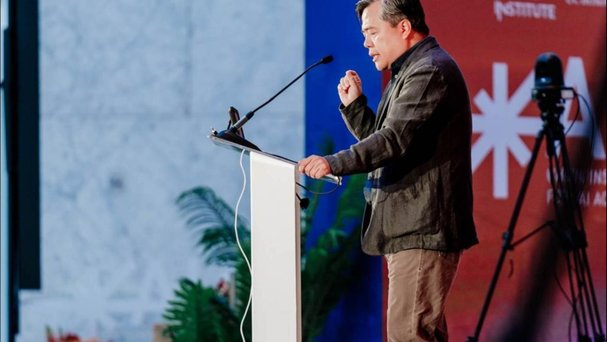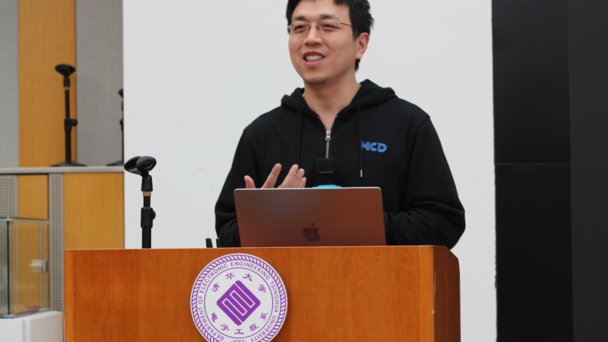TMTPOST -- Alibaba Group vows to double down artificial intelligence (AI)-related spending to bet on the industrial revolution driven by the tech.

Credit:China Unicom
“Today, AI technology advancements are driving profound industry transformation. In alignment with Alibaba Group's business landscape, we will scale up investments in the following three areas as part of our broader AI strategy over the next three years,” the CEO Eddie Wu said on an earnings call on Thursday.
Wu told analysts Alibaba will continue to focus on three business categories--domestic and international e-commerce, AI plus cloud computing and internet platform businesses. Wu divided libaba’s AI bets into three layers. First, Alibaba will aggressively invest in AI infrastructure. the company's planned investment in cloud and AI infrastructure over the next three years is set to exceed what it has spent over the past decade. Second, it will substantially increase research and development (R&D) investment in AI foundation models to maintain its technological leadership and drive the development of AI-native applications. Third, it will increase investment in AI application, R&D, and computing power and deeply integrate AI across its businesses.
Alibaba’s sales and earnings beat estimates for its third fiscal quarter ended December 31. Revenue gained 8% year-over-year (YoY) to RMB280.2 billion (US$38.4 billion), ahead of analysts estimated RMB277.4 billion. On Non-GAAP basis, Alibaba earned RMB21.39 diluted earnings per American depositary share (ADS) for the December quarter with a 13% YoY increase, versus analyst expectations of RMB19.47 per ADS.
Cloud Intelligence Group, which houses Alibaba’s AI-related projects and hosts computing power for external clients, posted the fastest revenue growth in about two years. The division brought RMB31.74 billion with a 13% YoY rise from September to December, more stellar than a 7% increase in revenue for the previous quarter. Alibaba mainly attributed the momentum to a double-digit public cloud revenue growth, including the growing adoption of AI-related products. Notably, AI-related product revenue maintained triple-digit year-over-year growth for the sixth consecutive quarter.
The December quarter saw Alibaba’s capital expenditure (CapEx) surged 260% YoY to RMB31.78 billion, up 80% from the previous quarter. The free cash flow, a non-GAAP measurement of liquidity, shed 31% YoY to RMB56.54 billion, mainly due to the increase in expenditure related to investments in cloud infrastructure.
Responding to a question about how the planned CapEx will impact overall profitability, Wu clarified the size of CapEx could be fluctuate within each year on a quarter-by-quarter basis over the next three years given the time that it takes for supply chains to provide what’s need,as well as for the internet data centers (IDCs) to get set up. But on a YoY basis,Wu noted the annual level of CapEx will be more or less equal across these three years. The next three years will likely be the single period in which Alibaba will be making the most concentrated and highest level of investments in building out its cloud and AI-related infrastructure, Wu said. He admitted the hardware infrastructure will have an impact in terms of depreciation, but observed the company expected huge demand for take-up on the part of both internal and external customers.
“Great opportunities, however, often require significant investment,” Barclays’ analysts commented “The next three-year period will likely be the single period in which Alibaba makes the most concentrated investment in AI and Cloud infrastructure build-out,” these analysts noted, adding that Alibab’s planned investment is poised to be more than what the tech giant has spent over the last ten years combined, which is almost 270 billion.
On the earnings conference, Wu stressed to pursue AGI, or artificial general intelligence, is Alibaba’s first and foremost goal for it viewed AI as “the kind of opportunity for industry transformation that really only comes about once every several decades.” When the standard AGI, namely, the AI that can replace or ahieve 80% of human capabilities, is achieved, it could have a significant influence on or even replace 50% of global GDP and have a tremendous impact in terms of restructuring industry around the world, Wu said. As to Alibaba’s cloud business, Wu said the company aims to build Alibaba Cloud into the most important AI infrastructure and one of the largest cloud computing networks that provide output of AI intelligence through deeper integration of cloud and AI.















